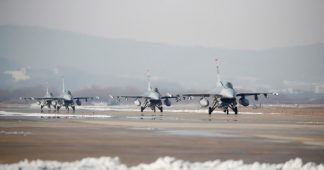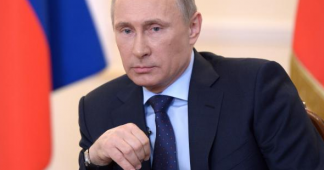By Bill Van Auken
15 September 2018
The past week has seen a growing drumbeat of US threats against the Syrian government of President Bashar al-Assad and its Russian and Iranian allies that Washington and its NATO allies are preparing to launch a major military assault in response to the offensive begun by Damascus to reassert control over the northwestern province of Idlib.
The Trump administration, which has twice carried out missile strikes on Syrian government targets on the pretext of responding to the alleged use of chemical weapons by government forces, is threatening to carry out significantly greater aggression this time around.
While Washington and its allies have all issued repeated warnings about a supposedly imminent chemical weapons strike by Damascus, the Russian defense ministry has reported that it has intelligence that Western-backed “rebels” have brought quantities of chlorine into Idlib and are preparing to stage and film a bogus attack in order to provoke a US-led bombing campaign.
US ambassador to the United Nations Nikki Haley made it clear in an interview with Fox News this week that Washington would not rely on a fake chemical attack. “Any offensive on the civilian people in Idlib was going to be dealt with,” she said, warning Damascus, Tehran and Moscow, “Don’t test us again.”
Under these conditions, one of the most right-wing figures in the New York Times’ stable of opinion writers has issued an angry indictment of the Trump administration for failing to prosecute a direct military confrontation with Iran in Syria.
“The Trump administration has made clear that its top priority in the Middle East is to thwart Iran’s nuclear and regional ambitions. So why is it so reluctant to lift a finger against Tehran’s most audacious gambit in Syria?” demands the columnist, Bret Stephens, referring to Idlib.
Stephens is an old hand at supporting and justifying US wars of aggression. In 2002-2003, his was one of the most vociferous voices in favor of an unprovoked war against Iraq. Writing for the Jerusalem Post—where he became editor—Stephens published a fearmongering article warning that without a US invasion, “an astonished world” would wake up to “the Arab world’s first nuclear bomb.” This was despite ample evidence that Baghdad’s limited nuclear program had long since been dismantled and that the entire campaign over Iraqi “weapons of mass destruction” was phony propaganda used to drag the American people into a war based upon lies.
While editor at the Jerusalem Post, Stephens led the right-wing Israeli newspaper in naming Paul Wolfowitz, the assistant defense secretary who was one of the main architects of the war, as its “man of the year.” It hailed him as the author of the criminal US preemptive war strategy that would “underpin U.S. action against other rogue states,” i.e., Libya, Syria and Iran.
Despite the exposure of the Bush administration’s WMD fraud, Stephens stuck to the propaganda narrative even a decade after the war, writing in the Wall Street Journal in 2013 that the self-evident charge that the Bush administration launched a war based upon lies was a “libel” and “cheap slander.” He claimed that the White House had based itself on “testimony of U.N. inspectors like Hans Blix,” itself a libel in that Blix had insisted that the Bush administration ignored his team’s warnings that there was no evidence to justify a war.
Stephens pulled up stakes at the Wall Street Journal, where he had become deputy editor, and moved to the Times after the election of Trump. He had been part of an “anyone but Trump” coterie of neocons and had announced that he would vote for Hillary Clinton, opposing the Republican candidate because of his failure to enunciate a sufficiently bellicose foreign policy, particularly toward Russia.
He was brought onto the Times by the paper’s editorial page editor James Bennet, a state-connected figure whose brother is a right-wing Democratic senator from Colorado and whose father was a State Department official who headed the Agency for International Development (AID), an instrument for CIA provocations in countries around the world.
Bennet wrote at the time that Stephens would “bring a new perspective to bear on the news,” along with “a deep sense of moral purpose and adventure about our work.” Such a glowing description for a right-wing warmonger.
Stephens wants blood and he makes no bones about his main concern: US strategic interests. He demands that Washington ditch the chemical weapons pretext as its “red line” and instead answer any offensive in Idlib with full-scale war.
If the Syrian government continues military operations to reestablish its control over Idlib, the US must “destroy everything that remains of the Syrian Air Force and crater the runways Iran uses to supply its own forces in Syria. If Assad continues to move, his presidential palaces should be next. After that, Assad himself. By then he will have been fairly warned.”
This is by no means Stephens’ first time advocating assassination as an instrument of statecraft. In 2013, he demanded in the pages of the Wall Street Journal that, should the Obama administration “decide to order a military strike against Syria, his main order of business must be to kill Bashar Assad. Also, Bashar’s brother and principal henchman, Maher. Also, everyone else in the Assad family with a claim on political power.”
That same year, he proposed a long list of attacks in a separate column, including sending in US ground forces. The Pentagon, he wrote, must “disable the runways of Syrian air bases, including the international airport in Damascus…use naval assets to impose a no-fly zone over western Syria…supply the Free Syrian Army with heavy military equipment, including armored personnel carriers and light tanks; and be prepared to seize and remove Syria’s chemical weapons stockpile, even if it means putting boots (temporarily) on the ground.”
This time around, he writes: “What the objective is not is to dictate Syria’s future or solve its problems, much less get into the weeds of sorting out Idlib’s bad rebels from the more moderate ones. Down that road lies Iraq II.”
The combination of hubris, ignorance and criminality here is breathtaking. After all, Stephens himself was a prominent advocate of going down the road of Iraq I that led to over a million deaths and decimated an entire society, creating the conditions for the growth of ISIS.
As for the “weeds” in Idlib, they consist principally of the fact that the so-called “rebels” are dominated by an armed organization that was the Syrian affiliate of Al Qaeda. Any US intervention will serve to defend and strengthen these forces. It would appear that, instead of Iraq II, Stephens prefers the road to Libya II, the systematic destruction of what remains of Syrian society and government and the unleashing of Al Qaeda and other Islamist militias to dominate the country.
“American policymakers desperately need to learn how to find the middle road between overreaction and inaction; between a missionary zeal to solve other people’s agonies and the illusion that we can remain aloof from them,” writes Stephens. Apparently, this middle road is to be paved with unrelenting cruise missile strikes and aerial bombardments, combined with wholesale assassinations and judicious ground occupations.
Such bloodthirsty proposals coexist on the Times editorial pages with the newspaper’s own recent editorial warning of “the risk of a humanitarian catastrophe” in Idlib. No such concerns were evinced in the face of the US sieges of Mosul in Iraq and Raqqa in Syria, where the dead number in the tens of thousands and the displaced well over a million.
Published alongside these hypocritical attempts to swing public opinion behind a US war in Syria has been a column written by Leila Al-Shami, who is published by Haymarket, the outlet of the International Socialist Organization (ISO), the State Department “socialists” who have relentlessly campaigned for a US military intervention under the guise of promoting the “Syrian democratic revolution.” Her September 2 column in the Times made the incomprehensible argument that a Syrian government offensive against Al Qaeda in Idlib would “eradicate the democratic alternative to tyranny, leaving the jihadists—who thrive on violence, oppression and foreign occupation—as the last men standing.”
All of these arguments, ranging from the neocon right, to the erstwhile voice of Democratic establishment liberalism to the pseudo-left “socialists,” are pursuing the same end, that of promoting a military confrontation in Syria that can quickly spill over to a regionwide war and even a clash between the world’s two largest nuclear powers, the US and Russia.
The fight to stop such a catastrophe can be waged only in irreconcilable hostility to all of these political forces and for the independent political mobilization of the working class against the capitalist system, the source of war, and the social system that all of these tendencies defend.











